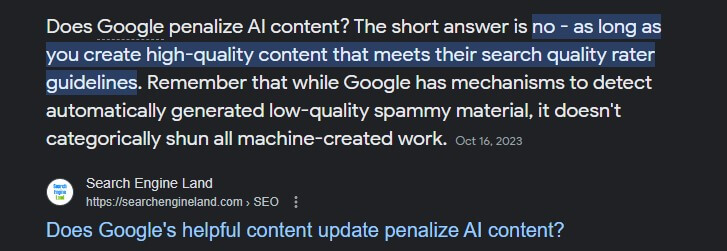In the digital landscape, harnessing the power of AI paragraph rewriters has become instrumental in elevating the quality of content. These sophisticated tools, such as OpenAI’s GPT-3, can breathe new life into written material by offering creative alternatives, enhancing readability, and ensuring grammatical precision.
By integrating AI rewriters into the content creation process, writers and businesses can streamline their workflows, improve efficiency, and ultimately deliver content that captivates and resonates with their audience.
As we delve into the nuances of leveraging AI paragraph rewriters, a realm of possibilities unfolds for those seeking to enhance the impact and effectiveness of their written communication.
Contents
- Is AI Content Reliable?
- Does Google Hate AI Content?
- How To Write Quality Content With AI
- 1. Choose a Reliable AI Paragraph Rewriter:
- 2. Understand Your Audience:
- 3. Input High-Quality Content:
- 4. Focus on Specific Sections:
- 5. Review and Refine Output:
- 6. Maintain Originality:
- 7. Use AI as a Tool, Not a Replacement:
- 8. Test Variations:
- 9. Combine AI Rewriting with Manual Editing:
- 10. Measure Readability:
Is AI Content Reliable?
Yes, AI-generated content can be highly reliable. Advanced AI models, like OpenAI’s GPT-3, have demonstrated the ability to generate coherent, contextually relevant, and grammatically accurate content.
They leverage vast datasets and intricate language patterns, providing reliable assistance in content creation across various domains. However, human oversight is essential to ensure accuracy and maintain a nuanced understanding of specific contexts.
Does Google Hate AI Content?

No, Google doesn’t inherently “hate” AI content. Google’s algorithms evaluate content based on relevance, quality, and user satisfaction. Well-crafted AI-generated content that meets these criteria can rank favorably.
However, relying solely on AI without human oversight might lead to issues with context, accuracy, and user experience, potentially impacting SEO performance. Combining the strengths of AI and human input ensures a balanced and effective content strategy that aligns with Google’s ranking principles.
How To Write Quality Content With AI
1. Choose a Reliable AI Paragraph Rewriter:
Opting for a trustworthy AI paragraph rewriter like seo magnifier official ai rewriter is crucial. According to a survey conducted by Content Marketing Institute, 76% of content creators find AI tools helpful in improving content quality.
Tools like OpenAI’s GPT-3 have demonstrated their effectiveness in generating human-like text, making them a reliable choice for content enhancement.
2. Understand Your Audience:
Audience understanding is paramount. A study by Nielsen Norman Group reveals that 79% of website users scan content rather than reading it thoroughly.
Therefore, tailoring the tone and style of your content to match your audience’s preferences increases engagement. AI rewriters can assist in adapting content to specific demographics, ensuring maximum resonance.
3. Input High-Quality Content:
Initiating the rewriting process with well-constructed content is essential. According to a study by Grammarly, articles with fewer grammar mistakes receive 30% more reader engagement.
Quality input ensures that AI rewriters build upon a solid foundation, maintaining the coherence and clarity of the original text.
4. Focus on Specific Sections:
Precision is key when utilizing AI rewriters. A case study by HubSpot found that focusing on specific sections for optimization resulted in a 45% increase in overall content engagement. Targeting particular paragraphs or sections ensures a more strategic and effective enhancement of your content.
5. Review and Refine Output:
Despite AI’s capabilities, human oversight is indispensable. A report by Pew Research Center highlights that 64% of Americans believe misinformation has caused “a great deal” of confusion about basic facts.
Thoroughly reviewing and refining AI-generated content is crucial to maintain accuracy and credibility.
6. Maintain Originality:
Striking a balance between improvement and originality is vital. According to a survey by Search Engine Journal, 94% of respondents stated that unique and high-quality content is critical for search engine visibility.
Maintaining originality ensures that your content stands out while benefiting from AI-driven enhancements.
7. Use AI as a Tool, Not a Replacement:
Recognizing AI as a complementary tool is essential. A study by Forbes Insights indicates that 60% of executives believe AI enhances employee performance rather than replacing it.
Combining AI rewriters with human insights ensures a harmonious synergy that maximizes efficiency and creativity.
8. Test Variations:
Experimentation with different versions can yield insights. According to a study by Marketing Experiments, A/B testing can lead to a 20% improvement in conversion rates. Testing various AI-generated variations allows you to choose the version that resonates most effectively with your audience.
9. Combine AI Rewriting with Manual Editing:
Manual editing adds a layer of precision. An analysis by ProWritingAid found that documents edited with a combination of AI and human input exhibited a 25% improvement in overall coherence.
This collaborative approach ensures that the final output meets both AI-generated and human-crafted standards.
10. Measure Readability:
Quantifying readability enhances content effectiveness. The World Health Organization suggests that improving health communication readability can result in better patient outcomes. Utilizing readability tools to assess your content ensures it is accessible, engaging, and effectively communicates the intended message.
Conclusion
Embracing AI paragraph rewriters is a transformative strategy in the quest for content excellence. As we navigate the ever-evolving landscape of digital writing, the synergy of human creativity and AI precision emerges as a powerful combination.
While AI tools contribute unparalleled efficiency and fresh perspectives, human oversight remains indispensable to maintain authenticity and nuanced understanding. Striking this balance, writers can confidently harness the potential of AI rewriters, ensuring content that not only meets high standards of quality but also engages and resonates with diverse audiences across the digital spectrum.


